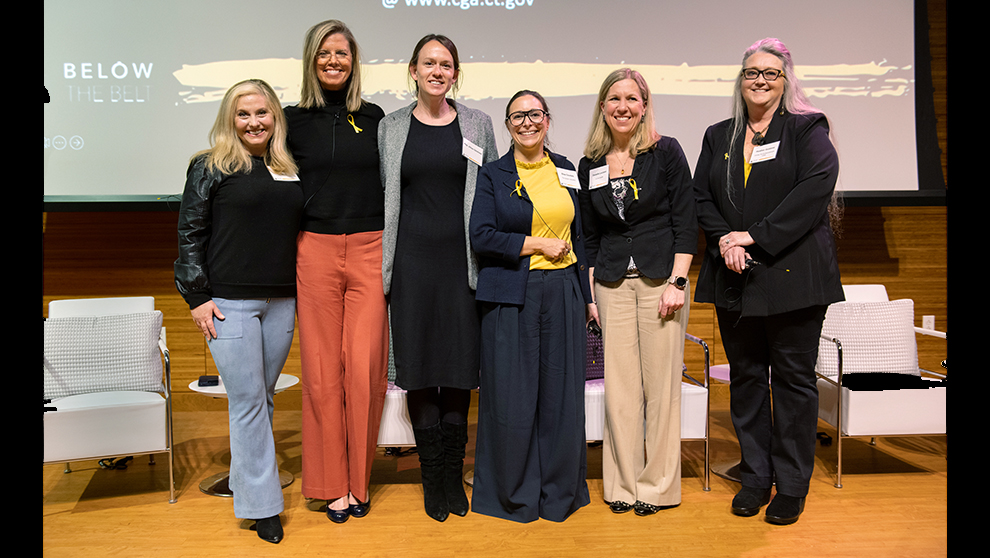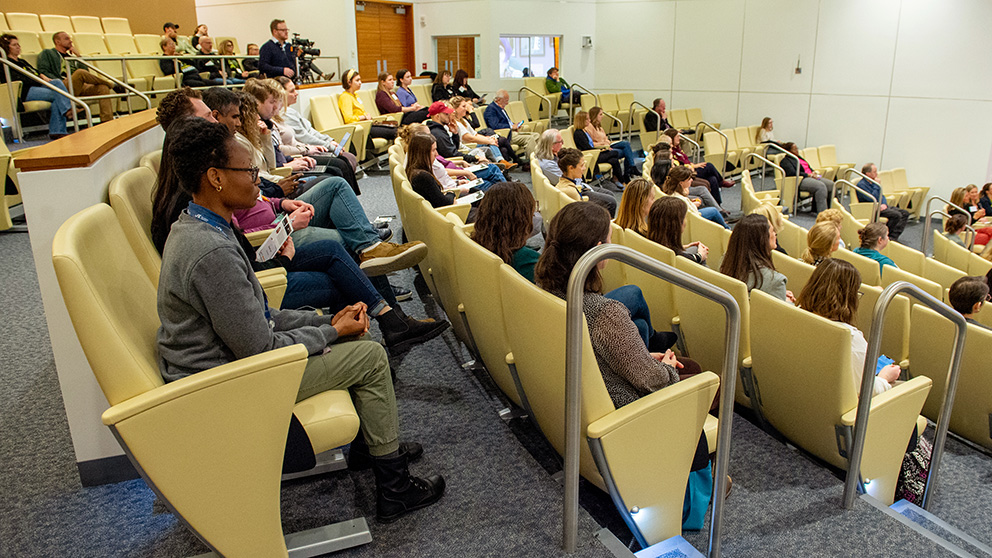 (L-R) WFSB-TV host Kara Sundlun,“Below the Belt” director Shannon Cohn, Connecticut state Rep. Jillian Gilchrest, JAX researcher Elise Courtois, Ph.D., UConn Health’s Danielle Luciano, M.D., and Board Certified Patient Advocate Heather Guidone. Photo credit: Cloe Poisson
(L-R) WFSB-TV host Kara Sundlun,“Below the Belt” director Shannon Cohn, Connecticut state Rep. Jillian Gilchrest, JAX researcher Elise Courtois, Ph.D., UConn Health’s Danielle Luciano, M.D., and Board Certified Patient Advocate Heather Guidone. Photo credit: Cloe Poisson
An early screening of a new film, “Below the Belt," took place March 7 at The Jackson Laboratory’s Farmington, Conn. campus. Directed by award-winning filmmaker, attorney, social movement builder and endometriosis patient Shannon Cohn, the film sheds light on endometriosis, an understudied and underfunded disease, and the many challenges it poses to patients, family members and providers.
The film provides a unique perspective on the condition that affects 1 in 10 women worldwide and is often misdiagnosed or mistreated. Featuring a diverse range of voices, including patients, doctors, family members and lawmakers, “Below the Belt” shares the experiences and insights into this chronic, painful and costly condition. Not only does insurance not cover life-changing lesion removal surgeries, but endometriosis can also cost patients the quality of their daily lives and derail careers and family plans.
The screening was attended by a variety of stakeholders, including endometriosis patients and advocates, healthcare providers and policymakers. The audience was moved by the powerful stories shared in the film, and afterwards engaged in a lively discussion during a panel session featuring Cohn and hosted by Kara Sundlun, Emmy award-winning news anchor and talk show host at WFSB-TV.
During the panel, JAX’s Interim Director of Single Cell Biology and endometriosis researcher Elise Courtois, Ph.D. addressed how the lack of research surrounding endometriosis has been a universal failure that she plans to resolve. Courtois studies endometriosis at the smallest unit level: the cell. Much of her work is in collaboration with UConn Health’s Director for the Minimally Invasive Gynecological Surgery Danielle Luciano, M.D. Luciano provided comments on how Connecticut can be an example in prioritizing women’s health.
 The audience in the JAX audiorium. Photo credit: Cloe Poisson
The audience in the JAX audiorium. Photo credit: Cloe Poisson
Courtois and Luciano are part of Connecticut state Rep. Jillian Gilchrest’s Endometriosis Working Group, which was established last year to increase awareness of endometriosis and expand access to care. This group’s priorities include creating an endometriosis data and biorepository program – the first public, multi-institution biorepository of its kind in the nation. The program plan is currently before the legislature, and the biorepository will act as a resource for storing diverse endometriosis samples and data to empower advancements in disease diagnostics and therapeutic strategies. It will also serve as a centralized resource to disseminate information, educate the public and providers, and raise awareness to promote early detection in adolescents and adults.
Gilchrest answered questions about the status of the biorepository and named it as a high-priority issue she will continue to address in the coming months. Her sentiments were echoed by Heather Guidone, board certified patient advocate and program director for the Center for Endometriosis Care, as she explained how her personal journey with the disease sparked her interest in empowering others with endometriosis to support local legislators who are fighting to provide resources to this underserved patient population.
"Below the Belt" is a timely and important film that highlights the urgent need for increased awareness, research and funding for endometriosis. With the potential to spark a much-needed conversation about this often-overlooked condition, there is hope that it will inspire action within Connecticut and beyond. The film will premiere on PBS in June.
To learn more about The Jackson Laboratory’s commitment to improving the lives of those impacted by endometriosis and the currently pending legislative effort, visit www.jax.org/endo.